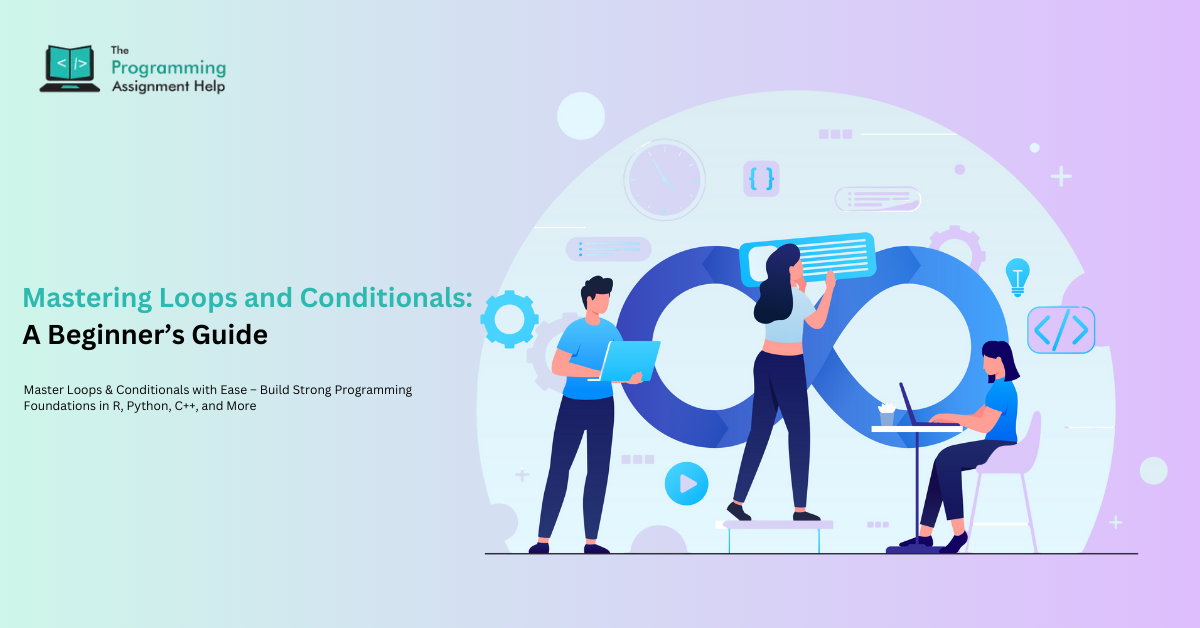
- 3rd Sep 2025
- 23:04 pm
- Dr. Michael Hernandez
Loops and conditionals are the foundation of writing logical, efficient and interactive code in programming. They enable programmers to automate all practices and make decisions in a program so that a program can respond to various scenarios. It is important to understand these concepts well whether you are learning R, python, Java or C.
Understanding Loops
A loop is a control statement, which repeats the implementation of a code of command until a condition is satisfied. In the absence of loops a repeated use of statements would be required to support a task that would print out all the numbers in the range 1 to 10. The same thing can be done with a loop by just a few lines of code.
Types of Loops:
- For loop – Best when the number of iterations is known. Example: printing squares of numbers.
- While loop – Applicable when the number of iterations is unknown, but is based on a condition. Problem: guessing a number randomly until one gets the right number.
- Do-while loop – Will execute the code block at least once, even when the condition is false. Example: asking the user to input a positive number.
Loops make calculations easier, like iterating through an array or summing numbers or generating sequences or modeling processes.
Example – For Loop (Printing squares of numbers):
for (int i = 1; i <= 5; i++) {
std::cout << i * i << " ";
}
Practical Uses of Loops
- Iterating through arrays or collections
- Calculating mathematical series or sums
- Generating random numbers or patterns
- Simulating processes in games or real-world scenarios
Understanding Conditionals
Conditionals are used to make decisions in the program depending on certain criteria. Like checkpoints, they make the code split off into multiple paths.
Types of Conditionals:
- If statement – Only executes code when a condition is true. Problem: testing whether a number is even.
- If-else statement – Gives a different route when the condition is false. Example: grading on a score basis.
- Nested conditionals – Provides a chance to explore several conditions one by one, such as determining whether a number is a positive, negative, or zero number.
Conditionals are also common in validation of user input, decision making, error handling and interactive program behavior.
Example – If-Else (Checking grades):
if (score >= 90) {
std::cout << "Grade: A";
} else if (score >= 80) {
std::cout << "Grade: B";
} else {
std::cout << "Grade: C or below";
}
Best Practices for Loops and Conditionals
- Choose wisely: A for loop is used when the number of iterations is known, a while loop when it is not.
- Avoid infinite loops: Ensure that the loop conditions become false.
- Maintain clarity: Assign significant names to variables, indent sufficiently and comment appropriately so as to make them easy to read.
- Break down problems: Divide the break logic into small units that they can manage in more complicated conditions.
Common Pitfalls and Debugging Tips
- Infinite loops: Ensure loop conditions eventually become false.
- Logic errors: Double-check conditions and operators.
- Debugging: Use print statements, IDE debuggers, and break down complex problems into smaller steps.
Conclusion
Loops and conditionals are the key elements that add logic and order to your programs. Learning how to use them enables automation of tasks, program control, and effective and adaptive writing in languages such as R, Python, and C++.
When you have problems with those ideas, it can really help to be advised by another professional. To help students learn how to apply these principles, our R Programming Assignment Help service is intended to help them learn how to apply these ideas effectively. We also offer Coding Assignment Help, C++ Assignment Help and Python Assignment Help to students who have to seek professional help. You can develop your coding skills, and finish your assignments with confidence with the help of the right support.
About the Author
Dr. Michael Hernandez
Qualification: Ph.D. in Cybersecurity and Software Engineering
Expertise: Specialized in secure software development and vulnerability analysis
Research Focus: Research on development of safe coding practices and codes to address and locate software vulnerabilities.
Practical Experience: Worked with organisations to implement secure coding guidelines, issue vulnerability testing as well as security solutions to complex systems.
Dr. Hernandez is a distinguished expert in software engineering and cybersecurity. His work has contributed to the best security practices in software security and to guard against the continuously emerging digital threats to applications.








